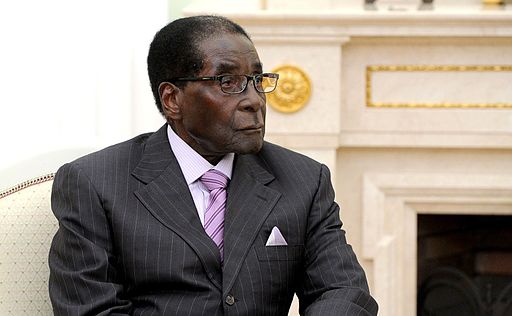 [Photo: Commonwealth Oral Histories 2015]
[Photo: Commonwealth Oral Histories 2015]
Immediate comment on Robert Mugabe’s death has focused on the woeful state of the country he ruled from 1980 until 2017. This includes 90% unemployment, which means that citizens survive via the black economy and remittances; collapsed public services, symbolised by six hours of electricity a day; hunger, in a country which had been a major food exporter; and an exodus of 3-4 million Zimbabweans, often the youngest and brightest, who have given up on a state which for so long has given up on them.
But his legacy is wider and deeper. No-one else, not Mandela with whom he feuded or Nkrumah whom he admired, combined authoritarianism and cruelty in the make-up of a hero of African liberation. For Comrade Robert Gabriel Mugabe, born two years before the baby girl who was to become Queen Elizabeth ll, the end always justified the means. Zanu-PF, (the Zimbabwe African National Union – Patriotic Front ) though militarised and corrupted in its later years, was his Leninist party instrument until his overthrow in an Army coup.
His successor, Emmerson Manangagwa, 77 on 15 September, has shown no real ability to change Zanu-PF, or its control over the levers of power. Although claiming to be a “born-again Christian” he was involved in several key elements of oppression which made the Mugabe years an aspirant dictatorship – the Gukurahundi war on Matabele “dissidents” in the 1980s which may have killed 20,000 people, and the reign of terror in 2008 after Mugabe lost presidential and parliamentary elections.
The Mugabe system is still in place, though what the 2017 coup demonstrated is that while Zanu-PF is a solid party, albeit with many factions, it is the military which can literally call the shots. ZANLA (the Zimbabwe African National Liberation Army) had been the armed wing of what was then Zanu in the war against white Rhodesia. Since the Army’s involvement in the civil war in the Democratic Republic of the Congo, in 1998, its leaders have been bound into the kleptocracy of illicit minerals which, along with the handout of formerly white farms to Zanu cronies inside Zimbabwe, kept the regime alive in spite of hyper-inflation and economic collapse.
The combination of corruption and blood on many of the leaders’ hands, makes it difficult for those running Zimbabwe to come to terms with the past. The country has a Human Rights Commission and a National Peace and Reconciliation Commission (NPRC), with a brave civil society and human rights lawyers. But they and a political opposition still built round the Movement for Democratic Change (MDC ) are up against powerful state broadcasters, partial judges and elections with gerrymandered constituencies, inadequate registration of voters, and intimidation.
On Mugabe’s death the NPRC extended condolences to his family and the government for the “sad, untimely departure of the liberation icon, mentor and Pan Africanist.” His state funeral will be a tribute to the old Non-Aligned Movement. While mentioning Mugabe’s efforts for reconciliation with whites in 1980, and with Joshua Nkomo’s ZAPU in 1987 and Morgan Tsvangirai’s MDC in a “global political agreement” after the rampage of 2008, the NPRC passed lightly over the “regrettable” Gukurahundi and made no mention of violent farm invasions, or assault on the shanty towns in Operation Murambutsvina in 2005. This last, reckoned to have destroyed 650,000-700,000 homes in the cities was described in a UN report by Anna Tibaijuka, head of UN-Habitat, as carried out in “an indiscriminate manner, with indifference to human suffering.”
Until his demise Mugabe remained a public hero in much of the African Union, even if leaders acknowledge his failings in private. No liberation party has yet been defeated in elections in South Africa, Namibia, Angola or Mozambique although Zanu-PF should have lost power in 2008. Mutual support by governments in the one-time frontline states remains important. Further, while many developing states depend on Chinese investment this has been taken to extremes, which will be hard to unravel, in the case of Zimbabwe. The Maoist era friendship, which took promising ZANLA cadres to China for training in the sixties and seventies, was given a “Look East” thrust in the era of turbocharged Chinese capitalism, as Mugabe’s economy imploded in the 21st century. President Xi Jinping and his predecessor, Hu Jintao, were among the first to accept invites to the state funeral.
Zimbabwe’s evolution is somewhat contingent on what happens in its hugely powerful neighbour, South Africa. Should the ANC lose power in the south the ripples will disturb Harare. And the Commonwealth, from which Mugabe exiled his country, and the UK, as the former colonial power, have continuing roles. Boris Johnson, when UK Foreign Secretary, and Catriona Laing, the then UK Ambassador in Harare, cosied up to Manangagwa until both moved on and his election was followed by violence by security services. With Johnson as Prime Minister it is likely that it will be the Commonwealth not the UK which promotes the 1991 Harare Principles, as Zimbabwe presses for re-entry.
Richard Bourne is the author of “Catastrophe: what went wrong in Zimbabwe?” and a member of the Round Table Editorial Board.



